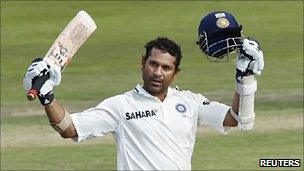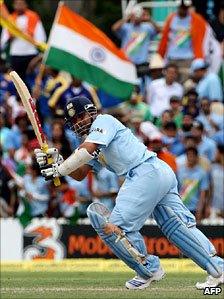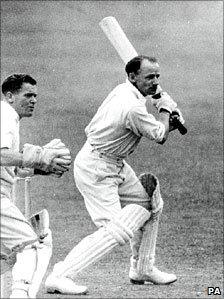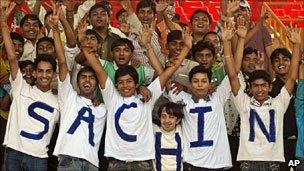Is Sachin Tendulkar the greatest cricketer ever?
- Published

Only 20 of Tendulkar’s 50 centuries have led to team victories
It is tempting to assume that, statistically at least, batting after Sachin Tendulkar will be like mountaineering after Everest.
But it was Sunil Gavaskar who put that in perspective upon becoming the first player to score 10,000 Test runs.
He said that history always remembers the first to a landmark. Edmund Hillary, Roger Bannister, Neil Armstrong.
Even if someone betters his record, no one can take credit away from Tendulkar for being the first to make 50 Test centuries.
If Don Bradman himself hadn't said so, it is unlikely that Tendulkar would be clubbed with him.
When the Don pointed out the similarity between the two to his wife, Tendulkar was only 23; it might have destroyed a lesser man.
But is he the greatest batsman of all time?
Bigger and better
The glib answer first. Yes.
Because it is in the nature of sport to produce bigger and better champions.
In sports where progress can be measured, this is seen in the faster timings, longer jumps and greater heights recorded by modern athletes.
In 1988, Ben Johnson needed to pump himself with stanozolol to run the 100 metres in 9.79 seconds. Last year Usain Bolt ran it in a comfortable 9.58.

Tendulkar is a 'one-stop shop' of batting skills
What about team sports?
The paleontologist and baseball nut Stephen Jay Gould once wondered why there were no near-perfect averages in baseball any more.
He put it down to declining variation, and far from endorsing the myth that the champions of the past were greater and that standards have fallen, he showed how it proves the opposite - that the standard of the sport has improved.
Declining variation is simply the difference between the average and the stellar performance.
As more players get better overall, the difference between the figures of the top player and the rest falls. Or as Gould puts it, systems equilibrate as they improve, a point demonstrated by analysing decades of baseball scores.
Statisticians adopted Gould's baseball methods to analyse Test batsmen and concluded that "for a current player to be relatively as good as Bradman - factoring in the bunching together of today's great players - he would need to average around 77."
The batsman with the best average today is England's Jonathan Trott, who in 16 Tests averages 57.28. No one is even suggesting that Trott is a "great" batsman, so clearly we must look elsewhere for a definition of greatness. Figures alone aren't enough.
Longevity is one (Bradman played from 1928 to 1948 with a break for the war years), impact on team results is another, impact on the opposition, quality of bowling attack faced - these are quantifiable.
What about the weight of expectations, the pressure from a billion and more fans, the influence on the game itself, the power to change the way people think?
A nation rode on Bradman's shoulders every time he went out to bat, but it was a small nation, hardly comparable to the nation on Tendulkar's back.
Second coming
Bradman's stature has grown every year that he hasn't played, and doubtless Tendulkar's will too after he is finished with the game. That is the romance of the sport.

Bradman toured only England
More than a decade ago, I wrote that Tendulkar was like the Taj Mahal - there was nothing new to be said about either.
But his "second coming" in recent years as a less destructive but in some ways more fearsome batsman calls for a whole new assessment based on his creative strokeplay and the sheer joy of displaying them around the world.
In cricket, as in art or literature, there cannot be a single "greatest".
Still, this is the bedrock of all sporting discussions. Woods or Nicklaus? Pele or Maradona? Spitz or Phelps?
Such debates have fuelled more arguments, sold more newspapers and emptied more kegs of beer in bars around the world than arguments about politics or religion.
Not even Bradman enjoyed unanimous acceptance as the greatest. In Australia, many thought Victor Trumper was the greater player, despite an average of 39.04.
Bradman and Tendulkar have much in common.
Tendulkar is, like Bradman was, a one-stop shop where state-of-the-art batsmanship is on display.
You could go to Virender Sehwag for the cover drive, or VVS Laxman for the on-drive or Rahul Dravid for the square cut or Kevin Pietersen for the lofted drive and so on - or you could get them all under one roof, as it were, with Tendulkar.
What next?
Where the careers of Bradman and Tendulkar begin to diverge is in the range and variety of international cricket the Indian has played.
There were no one-day internationals in Bradman's time. Bradman toured only England; he only played Tests at 10 venues - five in Australia and five in England.
In contrast, Tendulkar has played Tests in 10 countries, one-dayers in 17. He has played at 94 venues.

Tendulkar is a national icon
Bradman batted on uncovered wickets, Tendulkar had to counter reverse swing.
A whole new strategy - bodyline - had to be worked out just to counter Bradman's genius.
It consisted of bowling fast, virtually unplayable deliveries at the batsman's body with a phalanx of fielders on the leg side.
If you played the ball, you were caught, if you didn't, you risked serious injury. Bradman had his worst ever series, averaging just 56.57, and bodyline was outlawed.
After 50, what? A hundred international centuries (Tendulkar has 96), perhaps a World Cup win, maybe 200 Test matches?
Tendulkar has become used to those setting goals on his behalf moving the goalpost as he achieves these with almost monotonous inevitability.
Indian fans are happy to divorce individual performance from team effort, celebrating one loudly enough to drown the disappointment of the other.
Only 20 of Tendulkar's 50 centuries have led to team victories. But that, too, is only a number - as Tendulkar said of his 50.